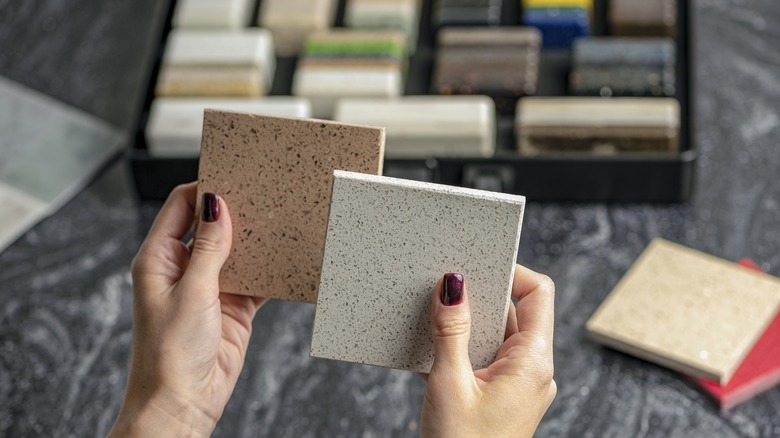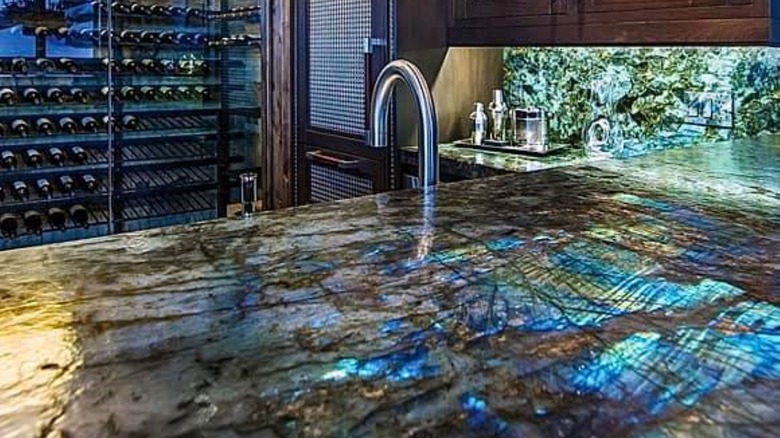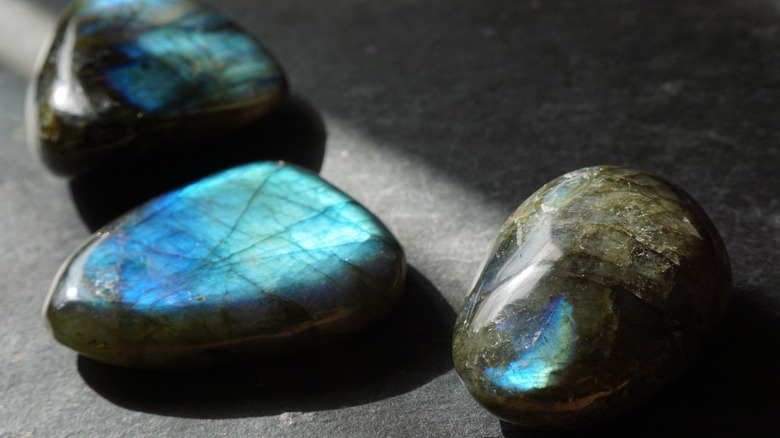The Most Expensive Countertop Material To Put In Your Kitchen
Whether you spend a lot of time in the kitchen or not, choosing the right type of countertop is crucial to ensuring that you reap the greatest benefit in terms of visual appeal, convenience, and longevity. With so many styles available for installation nowadays, countertops are a great medium to give your kitchen the extra space and protection needed when cooking, while also offering an outlet for self-expression through interior design. Natural stone is no stranger when it comes to fabricating countertops, with granite, quartz, and marble, for example, gaining and maintaining popularity among homeowners and developers alike over the past few decades. Though each of these materials is costly and comes with its own share of advantages and disadvantages, the most expensive countertop material available for your kitchen might be labradorite, a strong, iridescent stone that can cost homeowners up to $300 per square foot to source and install.
Easily recognizable for the shades of blue and green it radiates when met with direct sunlight, labradorite is a form of volcanic rock similar to granite in both texture and strength. Although, labradorite is proven to be even stronger than granite when compared directly, making the mineral a fantastic option to use for kitchen counters due to its durability and low-maintenance nature. Keep reading for more on why labradorite is so pricey, as well as the pros and cons of using such an expensive mineral in bulk around your kitchen.
How much does labradorite cost?
Ranging from $200 to $300 per square foot, labradorite completely outperforms competing countertop materials in terms of pricing, even surpassing the mineral's better-known and more widely-used counterparts, granite and quartz. When considering the amount of material needed to swap out a kitchen's countertops, the act of replacing a kitchen's existing counters with slabs of treated labradorite will likely cost thousands of dollars by the time the project is complete. Replacement countertops for a standard kitchen island alone may cost anywhere from $2,000 to $6,600, while costs to replace the countertops located throughout the average kitchen might fall between $6,000 and $12,000.
Labradorite is one of the most expensive minerals on the natural stone market because it can be challenging to find and outsource to clients for fabrication purposes. Natural labradorite is traced to extraction sites located all over the world, including the United States, but still classifies as a semi-precious stone, making it harder to find than more commonly used countertop materials but not as rare as classic gemstones like diamonds, emeralds, and sapphires. Also, given its rarity, labradorite may require a countertop specialist to install, as opposed to a standard contractor with limited experience. This factor could also impact the final cost of countertop installation, as professionals are inclined to charge more for their handiwork compared to a lesser-skilled laborer working with cheaper materials.
Other pros and cons
As with any other interior feature, labradorite countertops come with a list of pros and cons that may help you determine whether the luxurious amenity is worth the investment. An obvious advantage to installing labradorite in your kitchen is the mineral's appearance, the natural glimmer of which is reminiscent of the Northern Lights phenomenon seen in Alaska, Canada, and many European countries. The color that your Labradorite counters will appear depends on how the stone is cut. While the mineral mostly takes on dark shades of blue or green, some cuts of the stone may appear in various shades of red, yellow, purple, or pink. In terms of practicality, labradorite is a durable and reliable material, making it suited for the chopping, slicing, and pressure your counters will likely endure inside the kitchen. Labradorite countertops are also scratch-resistant, which may come in handy for homes frequented by children, pets, and visitors. The stone is also resistant to water and moisture.
However, like most other natural stone varieties, labradorite is sensitive to heat and may face permanent discoloration or cracking if left in direct contact with heated cooking utensils for extended periods of time. Labradorite counters don't respond well to harsh chemicals either, so ditch your acidic disinfectants and opt for mild, soapy water instead when cleaning them. To prolong the look of your countertops, seal the labradorite with an oil-based sealant every few years, just as you would for counters made of any other natural stone.


